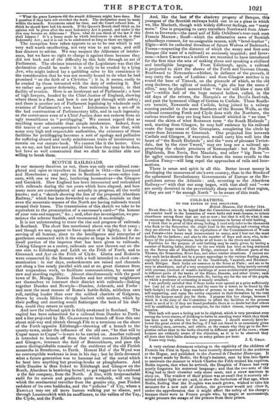COLD-BATHING.
TO TILE EDITOR Or THE SPECTATOR.
British Museum, 23d October 1844.
DEAR Sea—It is to be hoped that the Committee recently established will not restrict itself to the formation of warm baths and wash-houses, to induce cleanliness among those that are not so now ; but that it will do what it can to encourage the strong feeling already in existence in favour of cold-bathing. I think that in proof of this strong feeling, I need only refer to the thousands who flock to the Serpentine the single hour in the morning and evening when they are allowed to bathe by the regulations of the Commissioners of Woods and Forests—two hours most inconvenient to many, and I fear not the most healthy for the bathers ; and also to the number of boys and men, who, in de- fiance of the police-regulations, bathe at all hours in the rivers and canals. Facilities for the purpose of cold-bathing may be easily given, by having a number of floating baths, similar to the one which has been so long stationed on the Surrey side of Blackfriars Bridge, stationed in different parts of the Thames, the Serpentine, River Lee, and other similar situations. I cannot see why such baths should not be a proper appendage to the various floating piers, especially such as those attached to the Southwark, Vauxhall, and Hammer- smith Bridges. Such baths are common in the Seine at Paris ; and are to be seen in abundance, and of a very economical construction, being merely covered with canvass, (instead of wooden buildings of some architectural pretensions,) in different parts of the banks of the Rhine, Danube, and other rivers; each school on the banks, as at Darmstadt, &e. having one for the use of the pupils, to which a professor of swimming is usually attached. I am perfectly satisfied that if these baths were opened at a price sufficiently low (say id. or Id. each person, and the same for a towel, to be found by the bath-keeper) to allow a large number of persons to use them, they would be self-supporting, and repay the outlay expended in their formation by the rent which the keepers could pay for them. I propose this low charge, because I think it is the duty of the Committee to afford the facilities to the persons most in need of it : if they are found profitable there is no doubt but that others will be established, by private enterprise, for the richer classes, requiring more luxuries.
This bath will meet a feeling not to be slighted, which is very prevalent even among the lower classes, of disliking to bathe in standing water which they think has been used by others for the same purpose. I should scarcely have be- lieved the great extent of this feeling, if I had not found it so commonly given by working-men, servants, and others, as the reason why they go to the Ser- pentine rather than to the baths situated in different parts of the town ; whose keepers are evidently aware of the objection, as it is to be observed they all state that their baths discharge so many gallons per hour. Yours very truly, J. E. GRAY.
A very curious document relating to the captivity of the children of Francis the First in Spain has been recently discovered in the archives at the Hague, and published in the Journal de l'Institut Historique. It is a report made by Bodin, the King's huissier, sent by him into Spain to ascertain the manner in which Charles the Fifth treated his captives. Bodin reports, that when he arrived, the Dauphin of France had very nearly forgotten his maternal language ; and that the two sons of the King had in their chamber only stone seats, and a straw mattress to sleep on. The window of their prison was so small that it scarcely ad- mitted either light or air ; and, to show the barbarism of that age, when Bodin, finding that the Diuphin was much grown, wished to take his measure for a new suit of clothes, the governor would not allow it, under the apprehension that it might affect the safety of his charge ; because there were in France people who, by magic or necromancy, might procure the escape of the princes from their prison.


























 Previous page
Previous page